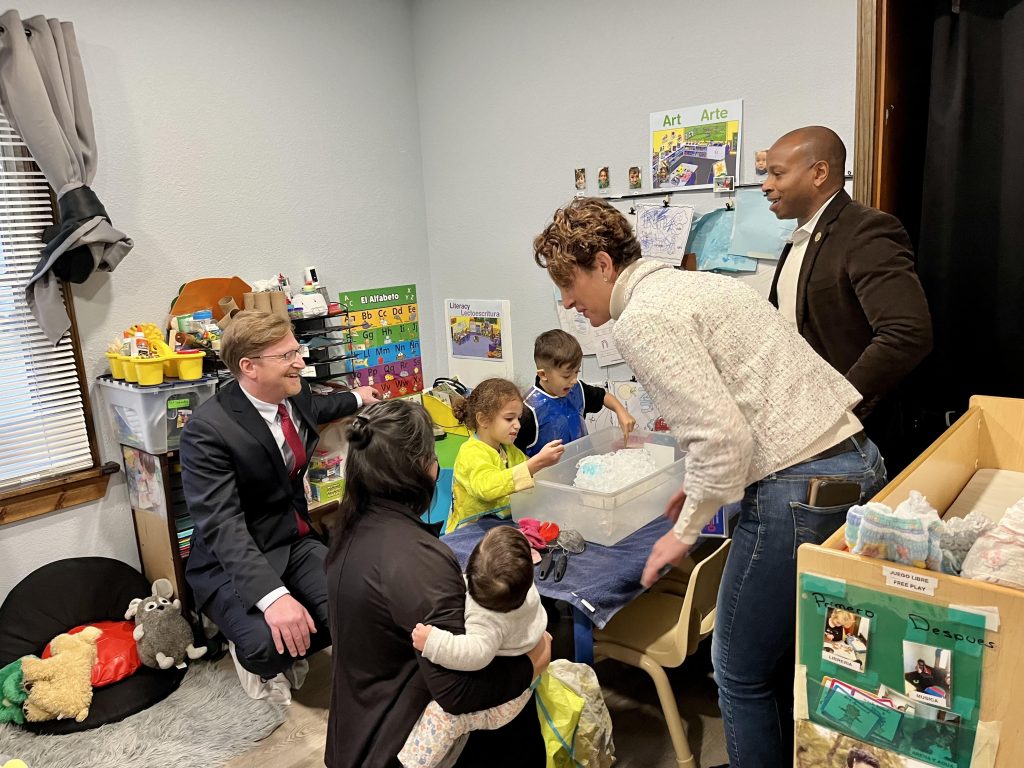Early Childhood Educators Getting $500 Bonuses
City allocated $7 million towards effort, designed to improve and expand childcare.

Alderwoman Marina Dimitrijevic (middle) visits Yimma’s Bright Beginnings in January with Mayor Cavalier Johnson (right) and Ald. Scott Spiker (left). Photo from Dimitrijevic.
The next payday will be a little bit sweeter for 1,935 early childhood educators in Milwaukee.
Backed by a city grant, the Wisconsin Early Childhood Association (WECA) awarded $500 bonuses to the eligible workers on Feb. 10. It’s the first of three $500 payments that will be awarded, with the goal of retaining early child workers and improving the quality of care provided.
In late 2021, the Milwaukee Common Council allocated $7 million from its $394.2 million American Rescue Plan Act federal grant to bolster the city’s early childhood education sector.
“I cannot think of a better use of our pandemic federal funding than putting it in the pockets of hardworking women in Milwaukee who take care of our children,” said lead sponsor Alderwoman Marina Dimitrijevic in a statement to Urban Milwaukee. “This investment is one huge step forward to stabilize our childcare sector and finally provide working mothers the support they need for them and their families to thrive. It’s one of my proudest moments in elected office.”
The program was developed by Milwaukee Succeeds‘ Milwaukee Early Childhood Education Coalition and is being facilitated by WECA. Milwaukee Succeeds reports the median starting wage for early childhood educators in the city is $13 per hour, less than big-box store wages.
“Early educators are the workforce behind the workforce. They allow parents of young children to go to work, and give children the foundation for success in school and beyond. The city’s investment in wage stipends will help build the stable, well-supported early education workforce that Milwaukee’s families deserve,” said Milwaukee Succeeds early childhood education director Daria Hall.
Based on data provided by Milwaukee Succeeds, 68% of the recipients identify as Black, 20% as white, 18% as Hispanic, 3% as multiracial, 2% as Asian and 5% as other. Respondents were able to select more than one option.
The organization said more work must be done to reach eligible workers who work for certified family providers. An email from Hall to program partners says that certified family providers have applied for the program at a lower rate than licensed family providers or licensed group centers.
In Wisconsin, certified providers are able to care for up to three children under the age of seven. Becoming a licensed provider requires more training, but allows for the care of more children.
Application information for the stipend program is available in English and Spanish.
According to research from Milwaukee Succeeds, there are 45,000 children in Milwaukee under the age of five, but only 28,000 childcare slots. The organization’s early childhood education program is focused on expanding the availability of care while also addressing cost issues with the care.
The stipends represent $5.1 million of the $7 million allocation.
An additional program at Milwaukee Area Technical College is to be expanded with $309,000. The dual enrollment program enables students to attend high school and college simultaneously while studying early childhood education. MATC will offer an 18-credit preschool technical diploma and create a pathway to the following two fellows programs:
The MKE Rising program was allocated to receive $529,500. The program prepares young men, through 10-month residency programs, for careers as childcare providers. The funding is intended to support successive classes of five individuals through 2024. According to WECA, 98% of workers today are female.
An additional $1.06 million was allocated to support 20 fellows in the Literacy Lab’s Leading Men Fellowship program designed to train men of color for careers in education.
If you think stories like this are important, become a member of Urban Milwaukee and help support real, independent journalism. Plus you get some cool added benefits.
Political Contributions Tracker
Displaying political contributions between people mentioned in this story. Learn more.





















